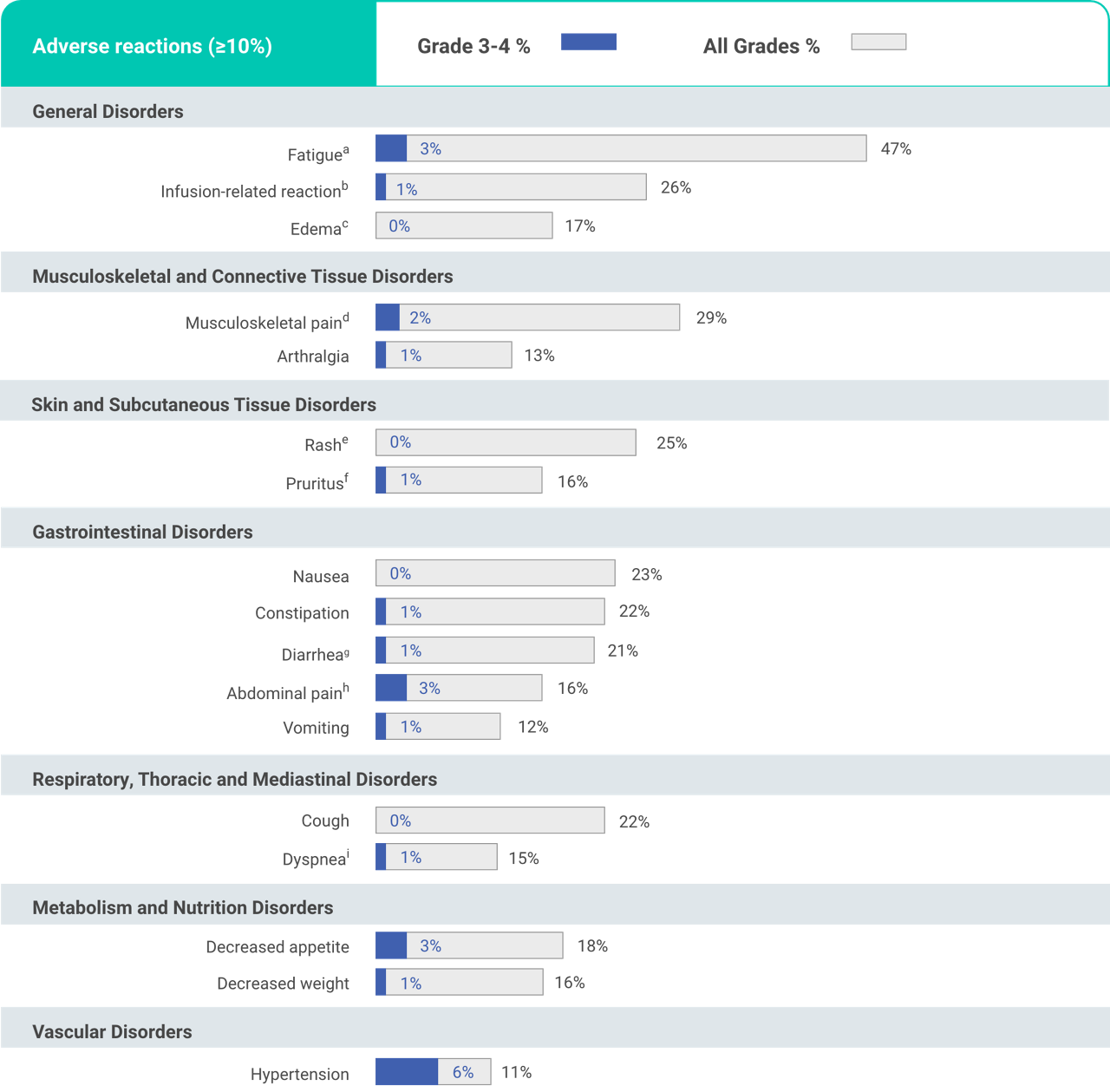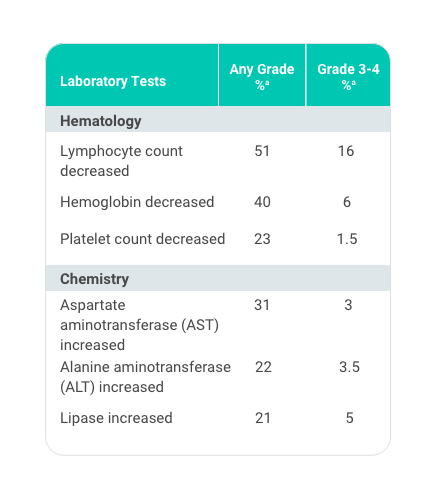The WARNINGS AND PRECAUTIONS were established based on data from over 1700 patients treated with BAVENCIO 10 mg/kg across multiple tumor types, the majority of whom were treated with BAVENCIO monotherapy.
Summary of warnings and precautions1
BAVENCIO can cause severe and fatal immune-mediated adverse reactions in any organ system or tissue and at any time after starting treatment with a PD-1/PD-L1 blocking antibody, including after discontinuation of treatment.
Early identification and management of immune-mediated adverse reactions are essential to ensure safe use of PD-1/PD-L1 blocking antibodies.
- Monitor patients closely for symptoms and signs that may be clinical manifestations of underlying immune-mediated adverse reactions
- Evaluate liver enzymes, creatinine, and thyroid function at baseline and periodically during treatment
- In cases of suspected immune-mediated adverse reactions, initiate appropriate workup to exclude alternative etiologies, including infection
- Institute medical management promptly, including specialty consultation as appropriate
No dose reduction for BAVENCIO is recommended. For immune-mediated adverse reactions, withhold or permanently discontinue BAVENCIO depending on severity.
- In general, withhold BAVENCIO for severe (Grade 3) immune-mediated adverse reactions
- Permanently discontinue BAVENCIO for life-threatening (Grade 4) immune-mediated adverse reactions, recurrent severe (Grade 3) immune-mediated reactions that require systemic immunosuppressive treatment, or an inability to reduce corticosteroid dose to 10 mg or less of prednisone or equivalent per day within 12 weeks of initiating corticosteroids
- In general, if BAVENCIO requires interruption or discontinuation, administer systemic corticosteroid therapy (1 to 2 mg/kg/day prednisone or equivalent) until improvement to Grade ≤1
- Upon improvement to Grade ≤1, initiate corticosteroid taper and continue to taper over ≥1 month
- Consider administration of other systemic immunosuppressants in patients whose immune-mediated adverse reactions are not controlled with corticosteroid therapy
- Toxicity management guidelines for adverse reactions that do not necessarily require systemic corticosteroids (eg, endocrinopathies and dermatologic reactions) are discussed in subsequent sections
BAVENCIO can cause immune-mediated pneumonitis.
- Withhold BAVENCIO for Grade 2, and permanently discontinue for Grade 3 or Grade 4 pneumonitis
- Immune-mediated pneumonitis occurred in 1.1% (21/1854) of patients, including fatal (0.1%), Grade 4 (0.1%), Grade 3 (0.3%), and Grade 2 (0.6%) adverse reactions
- Systemic corticosteroids were required in all (21/21) patients with pneumonitis
BAVENCIO can cause immune-mediated colitis.
- The primary component of immune-mediated colitis consisted of diarrhea
- Cytomegalovirus infection/reactivation has been reported in patients with corticosteroid-refractory immune-mediated colitis. In cases of corticosteroid-refractory colitis, consider repeating infectious workup to exclude alternative etiologies
- Withhold BAVENCIO for Grade 2 or Grade 3, and permanently discontinue for Grade 4 colitis
- Immune-mediated colitis occurred in 1.5% (27/1854) of patients, including Grade 3 (0.4%) and Grade 2 (0.8%) adverse reactions
- Systemic corticosteroids were required in all (27/27) patients with colitis
BAVENCIO can cause hepatotoxicity and immune-mediated hepatitis.
- Withhold or permanently discontinue BAVENCIO based on tumor involvement of the liver and severity of aspartate aminotransferase (AST), alanine aminotransferase (ALT), or total bilirubin elevation
- Immune-mediated hepatitis occurred with BAVENCIO as a single agent in 1.1% (20/1854) of patients, including fatal (0.1%), Grade 3 (0.8%), and Grade 2 (0.2%) adverse reactions
- Systemic corticosteroids were required in all (20/20) patients with hepatitis
BAVENCIO can cause primary or secondary immune-mediated adrenal insufficiency.
- For Grade 2 or higher adrenal insufficiency, initiate symptomatic treatment, including hormone replacement, as clinically indicated
- Withhold BAVENCIO for Grade 3 or Grade 4 endocrinopathies until clinically stable or permanently discontinue depending on severity
- Immune-mediated adrenal insufficiency occurred in 0.6% (11/1854) of patients, including Grade 3 (0.1%) and Grade 2 (0.4%) adverse reactions
- Systemic corticosteroids were required in all (11/11) patients with adrenal insufficiency
BAVENCIO can cause immune-mediated hypophysitis.
- Hypophysitis can present with acute symptoms associated with mass effect such as headache, photophobia, or visual field defects
- Hypophysitis can cause hypopituitarism. Initiate hormone replacement, as clinically indicated
- Withhold BAVENCIO for Grade 3 or Grade 4 endocrinopathies until clinically stable or permanently discontinue depending on severity
- Immune-mediated pituitary disorders occurred in 0.1% (1/1854) of patients, which was a Grade 2 (0.1%) adverse reaction
BAVENCIO can cause immune-mediated thyroid disorders.
- Thyroiditis can present with or without endocrinopathy
- Hypothyroidism can follow hyperthyroidism
- Initiate hormone replacement for hypothyroidism or institute medical management of hyperthyroidism, as clinically indicated
- Withhold BAVENCIO for Grade 3 or Grade 4 endocrinopathies until clinically stable or permanently discontinue depending on severity
- Thyroiditis occurred in 0.2% (4/1854) of patients, including Grade 2 (0.1%) adverse reactions
- Hyperthyroidism occurred in 0.4% (8/1854) of patients, including Grade 2 (0.3%) adverse reactions
- Systemic corticosteroids were required in 25% (2/8) of patients with hyperthyroidism
- Hypothyroidism occurred in 5% (97/1854) of patients, including Grade 3 (0.2%) and Grade 2 (3.6%) adverse reactions
- Systemic corticosteroids were required in 6% (6/97) of patients with hypothyroidism
BAVENCIO can cause immune-mediated type I diabetes mellitus, which can present with diabetic ketoacidosis.
- Monitor patients for hyperglycemia or other signs and symptoms of diabetes
- Initiate treatment with insulin as clinically indicated
- Withhold BAVENCIO for Grade 3 or Grade 4 endocrinopathies until clinically stable or permanently discontinue depending on severity
- Immune-mediated type I diabetes mellitus occurred in 0.2% (3/1854) of patients, including Grade 3 (0.2%) adverse reactions
BAVENCIO can cause immune-mediated nephritis with renal dysfunction.
- Withhold BAVENCIO for Grade 2 or Grade 3, and permanently discontinue for Grade 4 increased blood creatinine
- Immune-mediated nephritis with renal dysfunction occurred in 0.1% (2/1854) of patients, including Grade 3 (0.1%) and Grade 2 (0.1%) adverse reactions
- Systemic corticosteriods were required in 100% of patients with nephritis with renal dysfunction
BAVENCIO can cause immune-mediated dermatologic adverse reactions, including rash or dermatitis.
- Exfoliative dermatitis including Stevens Johnson Syndrome (SJS), drug rash with eosinophilia and systemic symptoms (DRESS), and toxic epidermal necrolysis (TEN), has occurred with PD-1/PD-L1 blocking antibodies
- Topical emollients and/or topical corticosteroids may be adequate to treat mild to moderate non-exfoliative rashes
- Withhold BAVENCIO for suspected and permanently discontinue for confirmed SJS, TEN, or DRESS
- Immune-mediated dermatologic adverse reactions occurred in 6% (108/1854) of patients, including Grade 3 (0.1%) and Grade 2 (1.9%) adverse reactions
- Systemic corticosteroids were required in 25% (27/108) of patients with dermatologic adverse reactions
BAVENCIO can cause other immune-mediated adverse reactions.
- Other clinically significant immune-mediated adverse reactions occurred at an incidence of <1% in patients who received BAVENCIO or were reported with the use of other PD-1/PD-L1 blocking antibodies
- For myocarditis, permanently discontinue BAVENCIO for Grade 2, Grade 3, or Grade 4
- For neurological toxicities, withhold BAVENCIO for Grade 2 and permanently discontinue for Grade 3 or Grade 4
BAVENCIO can cause severe or life-threatening infusion-related reactions.
- Premedicate patients with an antihistamine and acetaminophen prior to the first 4 infusions and for subsequent infusions based upon clinical judgment and presence/severity of prior infusion reactions
- Monitor patients for signs and symptoms of infusion-related reactions, including pyrexia, chills, flushing, hypotension, dyspnea, wheezing, back pain, abdominal pain, and urticaria
- Interrupt or slow the rate of infusion for Grade 1 or Grade 2 infusion-related reactions
- Permanently discontinue BAVENCIO for Grade 3 or Grade 4 infusion-related reactions
- Infusion-related reactions occurred in 26% of patients, including 3 (0.2%) Grade 4 and 10 (0.5%) Grade 3 infusion-related reactions
- Eleven (85%) of the 13 patients with Grade ≥3 reactions were treated with intravenous corticosteroids
Fatal and other serious complications of allogeneic hematopoietic stem cell transplantation (HSCT) can occur in patients who receive HSCT before or after being treated with a PD-1/PD-L1 blocking antibody.
- Follow patients closely for evidence of transplant-related complications and intervene promptly
- Consider the benefit versus risks of treatment with a PD-1/PD-L1 blocking antibody prior to or after an allogeneic HSCT
BAVENCIO can cause fetal harm when administered to a pregnant woman.
- Advise patients of the potential risk to a fetus including the risk of fetal death
- Advise females of childbearing potential to use effective contraception during treatment with BAVENCIO and for at least 1 month after the last dose of BAVENCIO
- It is not known whether BAVENCIO is excreted in human milk
- Advise a lactating woman not to breastfeed during treatment and for at least 1 month after the last dose of BAVENCIO due to the potential for serious adverse reactions in breastfed infants
JAVELIN Merkel 200 Trial—a Phase 2, open-label, single-arm, multicenter study of 204 patients with previously treated and treatment-naive metastatic MCC1
Serious adverse reactions occurred in 52% of patients receiving BAVENCIO. The most frequent serious adverse reactions (≥2% of patients) were general physical health deterioration, anemia, abdominal pain, acute kidney injury, sepsis, hyponatremia, and infusion-related reaction.
BAVENCIO—adverse reactions (≥10%) in patients with metastatic MCC from the JAVELIN Merkel 200 Trial

Other clinically significant adverse reactions in <10% of patients receiving BAVENCIO in the JAVELIN Merkel 200 trial were dizziness, headache, transaminase increased, creatine phosphokinase increased, and tubulointerstitial nephritis.
aFatigue is a composite term that includes fatigue and asthenia.
bInfusion-related reaction is a composite term that includes infusion-related reaction, chills, pyrexia, back pain, hypotension, drug hypersensitivity, dyspnea, flushing, and hypersensitivity.
cPeripheral edema is a composite term that includes peripheral edema, peripheral swelling, and genital edema.
dMusculoskeletal pain is a composite term that includes musculoskeletal pain, back pain, pain in extremity, myalgia, musculoskeletal pain, and neck pain.
eRash is a composite term that includes rash, erythema, rash maculo-papular, rash pruritic, dermatitis bullous, rash erythematous, and rash macular.
fPruritus is a composite term that includes pruritus and pruritus generalized.
gDiarrhea is a composite term that includes diarrhea and colitis.
hAbdominal pain is a composite term that includes abdominal pain, abdominal pain upper, and abdominal pain lower.
iDyspnea is a composite term that includes dyspnea and dyspnea exertional.
Discontinuations in the JAVELIN Merkel 200 Trial1
Permanent discontinuations
27%
of patients permanently discontinued treatment due to adverse reactions
- The most frequent adverse reactions (>1% of patients) that resulted in permanent discontinuation were infusion-related reaction, anemia, increased alanine aminotransferase (ALT), and increased aspartate aminotransferase (AST).
Temporary discontinuations
29%
of patients temporarily discontinued due to adverse events*
Temporary discontinuations
29%
of patients temporarily discontinued due to adverse events*
- The most frequent adverse reactions (>1% of patients) that resulted in permanent discontinuation were infusion-related reaction, anemia, increased alanine aminotransferase (ALT), and increased aspartate aminotransferase (AST).
- The most frequent adverse reactions (>1% of patients) requiring dosage interruption were nasopharyngitis, anemia, diarrhea, lung infection, and ALT increased.
*Excluding temporary dose interruption for infusion-related reactions.
The median duration of exposure to BAVENCIO was 4.1 months (range: 2 weeks to 48 months).
Immune-mediated adverse reactions in the JAVELIN Merkel 200 Trial2,3
1L (cohort B): patients with mMCC who were treatment-naive (N=116)
Incidence rate
6%
of patients (n=7/116) treated with BAVENCIO experienced a potential Grade ≥3 treatment-related immune-mediated adverse event*
2L+ (cohort A): patients with mMCC whose disease progressed on or after chemotherapy for distant metastatic disease (N=88)
Incidence rate
4.5%
of patients (n=4/88) treated with BAVENCIO experienced a potential Grade ≥3 treatment-related immune-mediated adverse event*
*Using the search term method.
Laboratory abnormalities worsening from baseline occurring in ≥20% of patients with metastatic MCC receiving BAVENCIO in the JAVELIN Merkel 200 Trial1


aEach test incidence is based on the number of patients who had both baseline and at least one on-study laboratory measurement available (range: 185 to 199 patients).
References: 1. Bavencio. Prescribing information. EMD Serono, Inc; 2023. 2. D’Angelo SP, Lebbé C, Mortier L, et al. First-line avelumab in a cohort of 116 patients with metastatic Merkel cell carcinoma (JAVELIN Merkel 200): primary and biomarker analyses of a phase II study. J Immunother Cancer. 2021;9(7):e002646. doi:10.1136/jitc-2021-002646 3. D’Angelo SP, Bhatia S, Brohl AS, et al. Avelumab in patients with previously treated metastatic Merkel cell carcinoma: long-term data and biomarker analyses from the single-arm phase 2 JAVELIN Merkel 200 trial. J Immunother Cancer. 2020;8(1):e000674. doi:10.1136/jitc-2020-000674




